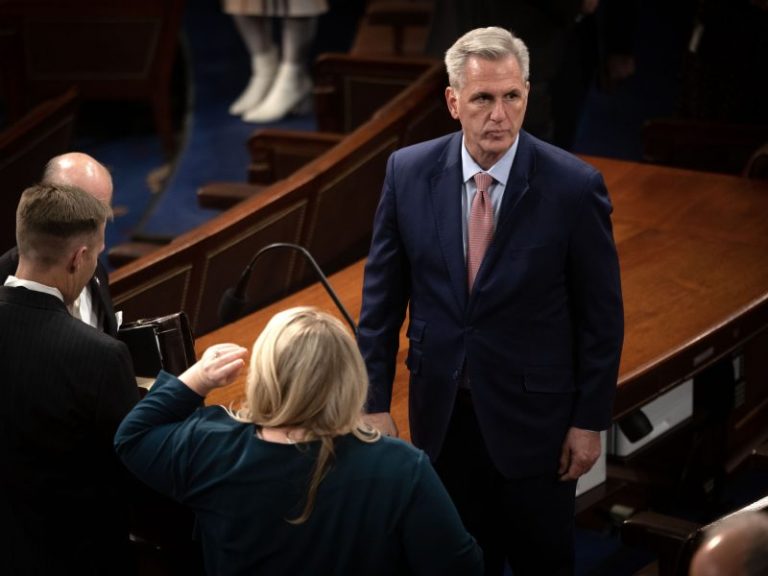As Ukrainian President Volodymyr Zelensky prepares to visit Capitol Hill later this week to lobby for additional aid in his country’s war against Russia, a conservative group released a “report card” Monday grading House Republicans on their support for Kyiv.
The newly released analysis highlights the stark divide within the Republican Party on providing more financial assistance to Ukraine. Of the 222 members, nearly as many failed the report card as received the highest mark. Defending Democracy Together, led by Republican strategist Sarah Longwell and conservative political commentator Bill Kristol, doled out 82 A’s, 43 B’s, eight C’s, 17 D’s and 72 F’s.
The bluntest split was between House Republican leadership and some of the most prominent current and former members of the hard-right House Freedom Caucus. Many members of the party’s rightmost flank have been advocating for cutting aid to Ukraine — in some cases, to zero.
Their desires hold sway, as House Speaker Kevin McCarthy (R-Calif.) needs their votes on spending bills to keep the government open past a Sept. 30 deadline. McCarthy’s speakership also hangs on the support of his most conservative members, who have threatened to seek his removal if he doesn’t meet their demands.
The report card is part of Defending Democracy Together’s $2 million Republicans for Ukraine campaign, which launched in August, to press GOP members of Congress to appropriate more funding for aid to the U.S. ally. Defending Democracy Together determined grades by weighing how members had voted on Ukraine-related bills, as well as their public statements about that nation’s war against Russia.
Gunner Ramer, a spokesman for Republicans for Ukraine, said his organization initiated the project in response to the GOP’s recent shift toward greater isolationism. The number of members who received low grades signals to him that the party’s House delegation is “not fully in support of democracy.”
“I think that 10 years ago, that would have shocked me,” he said. “But today it doesn’t shock me, because this isolationist, Donald Trump-led Republican Party no longer stands for what it once used to.”
A growing number of congressional Republicans are expressing skepticism about Biden’s request for an additional $24 billion in aid for Ukraine. While Senate leaders have indicated support for the supplemental funding, several members of the House have said they would not back more aid for the Eastern European democracy as it struggles to win a definitive victory in its counteroffensive.
Recent public opinion surveys suggest that Americans’ support for Ukraine is moving in the same direction. Among Republicans specifically, 56 percent said in a Fox News poll released last month that U.S. assistance to Ukraine should be decreased — up from the 38 percent who said the same in December.
The White House insists that the nation remains committed to supporting Ukraine.
“We want to see the war end,” National Security Council spokesman John Kirby told reporters Wednesday. “And it could end today, obviously, if [Russian President Vladimir] Putin would do the right thing and just get the hell out. That’s clearly not going to happen right now. So we’re going to continue to provide Ukraine with the capabilities that they need to be successful.”
McCarthy, who got a B- on the report card, has been uneven on the topic of Ukraine. He said last fall that the United States should not give Kyiv a “blank check,” but this spring told a Russian reporter that he does support sending aid. A spokesman for McCarthy said this month that considering Biden’s request for more funding is not a priority for the speaker.
The other four House Republican leaders also scored relatively highly: House Majority Leader Steve Scalise (La.) received a B, and Majority Whip Tom Emmer (Minn.) got an A. Rep. Elise Stefanik (N.Y.), chairman of the Republican Conference, and Rep. Gary Palmer (Ala.), who chairs the Republican Policy Committee, each scored a B-.
In contrast, three of the most high-profile members of the Freedom Caucus — Reps. Lauren Boebert (Colo.), Paul A. Gosar (Ariz.) and Jim Jordan (Ohio) — and a prominent former member, Rep. Marjorie Taylor Greene (Ga.), each received an F.
Asked to comment on support for Ukraine aid, a spokesperson for Greene pointed to her comments Wednesday that “not a single penny” of U.S. taxpayer dollars should go to a “proxy war” in Ukraine.
“I’ll proudly hang that report card up in my office,” Greene told The Washington Post in a statement. “When the America Last grading system awards an A for putting another country’s borders before our own, I’m happy to receive an F.”
Spokespeople for McCarthy, Scalise, Emmer, Stefanik, Palmer, Boebert, Gosar and Jordan did not respond to requests for comment.
Defending Democracy Together also plans to advocate for additional aid to Ukraine by placing mobile billboards in the districts of House Republican leadership and running an ad campaign on Fox News and elsewhere. The group said its first Ukraine ad aired during the first Republican primary debate on Fox News last month.
In addition to influencing legislators, Ramer said that the efforts are meant to show Republican voters that other GOP members back continued funding for Ukrainian defense. The group is banking on the idea that like-minded people will be convincing messengers.
“When you look at what Russia has done to the people of Ukraine, it is despicable,” Ramer said. “And I think that any traditional Republican, conservative should look at what is happening in Ukraine and be completely dismayed by it.”

